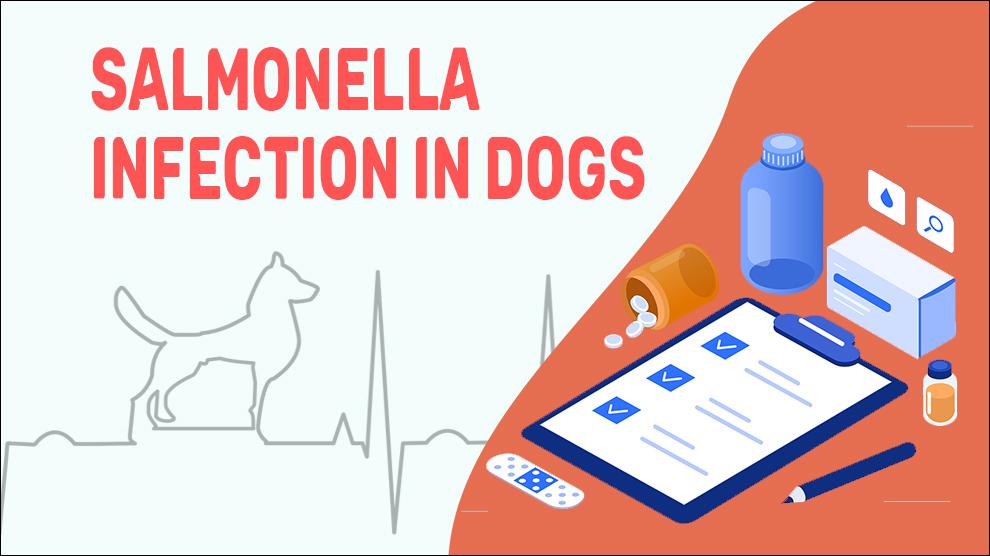Salmonella species are Gram-negative, motile, anaerobic, acid-labile facultative bacilli characterized by H, Vi, and O antigens. Salmonella genus is split into 2 species (Salmonella bongori and Salmonella enterica) with the proposed third species (Salmonella subterranean) approval still pending. Overall, there are over 2500 known serovars of salmonella.
Sometimes, Dogs may also carry salmonella bacteria in their GI tracts like reptiles and livestock. Salmonella typhimurium is the most common species of salmonella that exists in dogs and cats.
Salmonella is mostly a gastrointestinal (local) pathogen, but can also cause serious systemic infection (enteric fever), and sometimes dogs can be an asymptomatic carrier of salmonella.
As they are zoonotic pathogens, Infection can be directly transmitted between infected animals and between humans and animals. Salmonella spreads mainly through fecal-oral contamination or by fomite-associated transmission (contaminated things). Contaminated food and water are the main sources of infection
International veterinary publications indicate that dry or wet dog food and a raw diet that is not stored at the correct temperature as the most common route of transmission in dogs.
Incubation period: 6–72 hrs (with a range of 1–14 days)
Symptoms Of Salmonella Infection
Treatment Options For Salmonella Infection
- Immediate hospitalization and close monitoring are required as this pathogen, if not treated immediately, may cause death.
- Intravenous fluid and nutritional therapy will be given to help your dog not become severely dehydrated.
- Your vet keeps your dog hydrated and only treats the symptoms while the disease runs its course.
- Immunosuppressive or anti-inflammatory medications.
- Anti-diarrhea medications.
- A broad-spectrum antibiotics for any other bacterial infections from occurring.
Home Remedies For Salmonella Infection
- Keep the affected dog in isolation and after they are deemed recovered for at least two more months.
- Make sure that your dog gets appropriate medications.
- Limit the exposure of puppies to other dogs that may be infected or carrying the infection until they have completed their treatment.
- It is advisable to keep your dog’s bedding clean and sterile.
Prevention Of Salmonella Infection
- Feed high-quality food and exercise regularly.
- Avoid giving your dog raw or undercooked meats from suspected sources.
- Follow the annual dewormer protocol for dogs as suggested by your vet to maintain gut health.
- Prompt detection (performing fecal tests 2-4 times yearly for adult dogs).
- Clean up backyard periodically; maintain sanitary and hygienic conditions in the home.
Affected Breeds Of Salmonella Infection
Puppies, Senior Dogs
There is no breed disposition
Additional Facts For Salmonella Infection
1. Risk factors:
- Old dogs/Immunocompromised condition
- Poor nutrition- raw or undercooked meat
- Presence of cancer or neoplasia
- Other concurrent diseases
- Administration of antibiotics, steroids, or chemotherapy
2. Causes:
- Direct contact with infected dogs in boarding/kenneling situations, dog shows, shelters, etc
- Transplacentally to the fetuses
- Direct contact with surface pathogens in clothing, bowls, etc
- Ingestion of infected fecal matter
3. Mortality:
The mortality rate from salmonella infection in dogs is <1%. But the mortality rate is significantly higher if the outbreaks happen in a closed setting like kennels and hospitals.
4. Diagnosis:
- Complete blood count (CBC), blood chemistry profile
- Electrolyte panel
- Urinalysis
- Antigen test (enzyme immunoassay or EIA)
5. Prognosis:
Although in healthy dogs, salmonella infection cures on its own. Recovery from salmonella infections varies case by case. Complete recovery depends on the severity of the disease and the damage it has done. Without treatment, the survival rate of puppies/older dogs/ dogs with extremely poor gut health significantly decreases.
When To See A Vet
Contact your vet right away, if you notice any of the following:
- Frequent diarrhea that may contain blood or mucus
- Vomiting
Food Suggestions For Salmonella Infection
- Brown rice, lukewarm (never hot) chicken soup with Low sodium or chicken breast and cooked vegetables is perfect for the ailing pup.
- Add a couple spoonful of salmon, tuna, mackeral, anchovies or another fish product to your dog’s food.
- Too much canned fish is bad for sick pups. A small quantity to tempt an unwell pet to eat is usually ok.
- Shredded chicken with a carrot stick.
- Meat-flavored baby food or bland food.
- Semi-moist pet food with boiled chicken.
Conclusion
Long periods (>2 months) of treatment may be needed for dogs with systemic infections. After the initial infection, Salmonella may persist for a long time in intestinal epithelia and lymph nodes. The period of fecal excretion of the pathogen is usually 2-5 weeks.
In most cases, salmonella infection will settle without treatment, drugs may minimize symptoms or speed recovery amid infection.

















